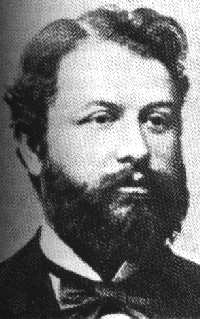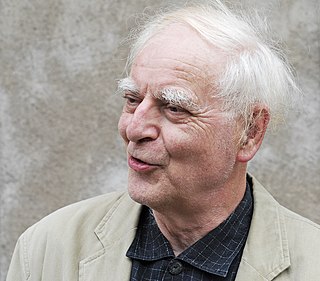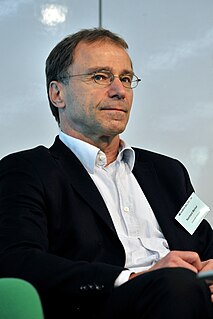
Hermann Eduard von Holst was a German-American historian.

Georg Jellinek was a German public lawyer, considered of Austrian origin, and was considered to be "the exponent of public law in Austria“.

Adolf Muschg is a Swiss writer and professor of literature. Muschg was a member of the Gruppe Olten.

Georg von Welling (1655–1727) born, 1655, in Kassel in Hesse, was a German alchemical and theosophical writer, known for his work Opus mago-cabalisticum, first published incomplete under the pseudonym Gregorius Anglus Sallwigt in 1719. By profession he worked in the mining industry, becoming Director in the Baden-Durlacher Office of Building and Mines. He lost his position in 1723, and retired to Bockenheim near Frankfurt, where he died in 1727. The first complete publication of his major work, Opus Mago-cabbalisticum et theosophicum, was printed in 1735 8 years after his death.

Herfried Münkler is a German political scientist. He is a Professor of Political Theory at Humboldt University in Berlin. Münkler is a regular commentator on global affairs in the German-language media and author of numerous books on the history of political ideas, on state-building and on the theory of war, such as "Machiavelli" (1982), "Gewalt und Ordnung" (1992), "The New Wars" and "Empires: The Logic of World Domination from Ancient Rome to the United States". In 2009 Münkler was awarded the Leipzig Book Fair Prize in the category "Non-fiction" for Die Deutschen und ihre Mythen.

Hilde Benjamin was an East German judge and Minister of Justice. She is best known for presiding over a series of political show trials in the 1950s. She is particularly known as responsible for the politically motivated persecution of Erna Dorn and Ernst Jennrich. Hilde Benjamin was widely compared to the Nazi-era judge Roland Freisler and referred to as the "Red Freisler." In his 1994 inauguration speech German President Roman Herzog mentioned Benjamin's status as a symbol of injustice, noting that her name was incompatible with the German constitution and the rule of law.
Klaus Gustav Heinrich von Beyme is Professor of Political Science Emeritus at the Faculty of Economic and Social Sciences of the University of Heidelberg.
Gertrude Lübbe-Wolff is a German academic and senior judge. She sits on the second senate of the Bundesverfassungsgericht, having succeeded Jutta Limbach in this position in April 2002.
Eckhard Jesse is a German political scientist. He held the chair for "political systems and political institutions" at the Technical University of Chemnitz from 1993 to 2014. Jesse is one of the best known German political scholars in the field of extremism and terrorism studies. He has also specialized in the study of German political parties and the German political system.
Georg Paul Wannagat was a German jurist and President of the Bundessozialgericht.

Margrave William of Hachberg-Sausenberg was the son of Margrave Rudolf III of Hachberg-Sausenberg and Anne of Freiburg-Neuchâtel. He ruled from 1428 to 1441, and abdicated on 21 June 1441 in favor of his infant sons, Rudolf IV and Hugo. As they were still infants, his cousin Count John of Freiburg-Neuchâtel took over the government as regent.
Manfred Berg is a German historian who serves as the Curt Engelhorn Chair in American History at Heidelberg University. He has also served as Heidelberg University's dean of faculty. He previously taught at the Free University of Berlin and served at the German Historical Institute in Washington D.C.

Reinhard Merkel is a professor in criminal law and philosophy of law and a retired West German swimmer. He competed at the 1968 Summer Olympics in the 200 m and 400 m individual medley and finished in sixth place in the latter event.
Ernst Levy was a German American legal scholar and historian of law. He was a Professor of Roman Law at the Goethe University Frankfurt (1919–1928) and the University of Heidelberg (1928–1935). Being Jewish, he was forced to retire in 1935, and decided to emigrate from Nazi Germany to the United States. At the University of Washington, he was a Professor of Law and History from 1937 to 1952.

Spiros Simitis is an internationally recognised German jurist and a pioneer in the field of data protection. In recognition of his role, admirers sometimes describe him as "the man who invented data protection".
Alois Ickstadt is a German pianist, choral conductor, university professor and composer.
Joseph Maria Müller-Blattau was a German musicologist and National Socialist cultural official. He is regarded as a "nestor of Saarbrücken musicology" but also as a "singer of a musical seizure of power" because of his activities in National Socialism.
Stefan Breuer is a German sociologist, and a specialist of the writings of Max Weber and the political right in Germany between 1871 and 1945.






















